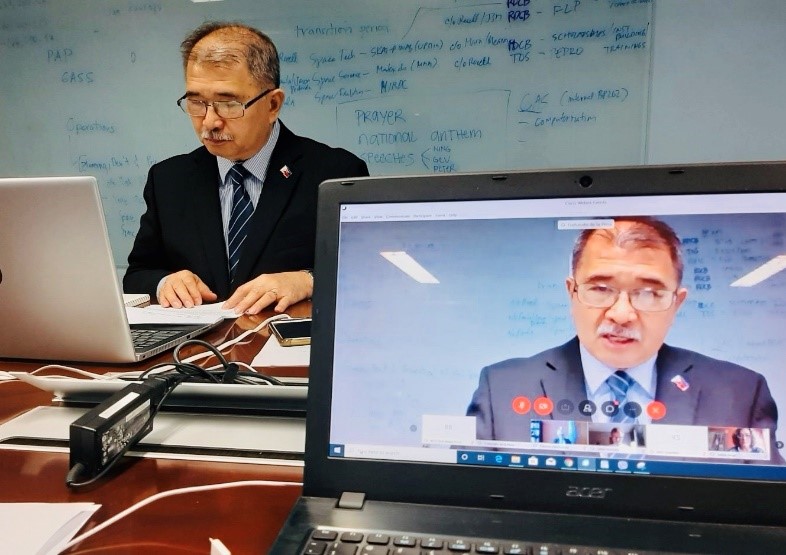
Photo: H.E. Fortunato T. Dela Peña, Secretary of Science and Technology, details DOST’s health system apps and innovations in the country’s COVID-19 response and recovery strategy.
11 June 2020, New York – At the United Nations High-Level Debate on the Impact of Rapid Technological Change on the Sustainable Development Goals and Targets, DOST Secretary de la Peña stressed that “Filipino natural resiliency and creativity are greater” than the unprecedented and new challenges brought about by the COVID-19 pandemic.
He said that there has been a significant increase in the recognition of science, technology, and innovation (STI) as a solution to issues that cut across various disciplines; and highlighted the importance of DOST’s own research development and technologies as basis of the country’s interventions to address the pandemic.
The Secretary underscored the importance of DOST’s health systems apps and innovations in the country’s COVID-19 response and recovery approach such as (i) FASSSTER, a web application used for creating disease models for dengue fever, typhoid fever and measles and for visualizing syndromic surveillance reports through a spatio-temporal map, now being used to model the behavior of COVID-19; (ii) the local technology platform for dengue, which was remodeled into an effective RRT-PCR COVID-19 detection kit; (iii) the Quick Response (QR) codes through a RapidPass System use to ease access through the Quarantine Control Checkpoints (QCPs); (iv) the innovative telemedicine device RxBox; (v) the locally developed ventilator; and (vi) the use of mechatronics and robotics for physical rehabilitation therapy, among others.
Secretary Dela Peña also welcomed the recent call of the Secretary General (SG) to evolve the support of the UN Development System to middle-income countries (MICs) in all their diversity, as well as the SG’s recommendation to support MICs in building necessary human, organizational and information assessment capacity; developing economic, regulatory and legal frameworks that provide positive incentives to innovate; and creating new and innovative mechanisms for technology transfer.
The President of the General Assembly convened the high-level debate in accordance with General Assembly resolution 73/17 to highlight the efforts made by the UN system, other multilateral institutions, the private sector and stakeholders to achieve the SDGs while taking in consideration the impact of rapid technological changes, such as artificial intelligence, among others to the Sustainable Development Goals and targets.
Among the speakers were H.E. António Guterres, Secretary-General of the United Nations; H.E. Tijjani Muhammad-Bande, President of the General Assembly; H.E. Mona Juul, President of the Economic and Social Council; Mr. Brad Smith, President of Microsoft Corp.; H.E. Mukhisa Kituyi, Secretary-General of UNCTAD; H.E. Houlin Zhao, Secretary-General of ITU; H.E. Ángel Gurría, Secretary-General of OECD; Mr. Liu Zhenmin, Under Secretary-General of UNDESA; Ms. Sonia Jorge, Executive Director, Alliance for Affordable Internet; and, Ms. Kriti Sharma, Young Leader for SDG’s, Founder & Chair, AI for Good.
The debate can be viewed at http://webtv.un.org/meetings-events/watch/general-assembly-virtual-high-level-thematic-debate-on-the-impact-of-rapid-technological-change-on-the-sustainable-development-goals-and-targets/6163465199001/?term=.-
END


